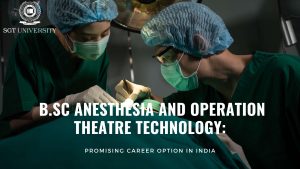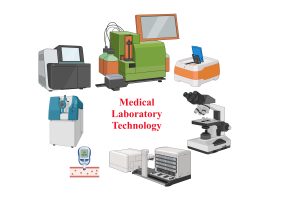The global pandemic has highlighted the growing importance of microbiology in understanding and tackling infectious diseases. This has led to rising demand for qualified microbiology professionals in healthcare, pharmaceuticals, agriculture, food technology, and other industries. Gain an in-depth understanding of microorganisms and prepare for a meaningful career in microbiology with a BSc degree in Microbiology.
TABLE OF CONTENT
- What is BSc Microbiology?
- Why Study BSc Microbiology?
- B.Sc. in Microbiology Career Scope and Job Opportunities
- BSc in Microbiology Colleges in Gurgaon, Haryana, and Delhi NCR
- About the BSc in Microbiology Course, Colleges, Fees, Eligibility, Syllabus
- BSc in Microbiology Fees
- BSc Microbiology Syllabus
- BSc Microbiology Eligibility
What is BSc Microbiology?
The global pandemic is just one example of how the complexity of diseases caused by microorganisms has increased recently, driving up demand for BSc Microbiology courses. Microbiology is the study of microorganisms such as bacteria, viruses, fungi, and protozoa. It is a broad field with applications in a variety of industries, including the environment, food technology, pharmaceuticals, healthcare, and agriculture. Students can gain a solid foundation in this ever-evolving field with a B.Sc. in Microbiology. Topics covered in its curriculum include industrial microbiology, mycology, biostatistics, and more, giving students the tools they need to succeed in the workforce.
Why Study BSc Microbiology?
The advantages that come with a BSc in Microbiology make the degree highly sought after. After completing the course, candidates may find employment in various research labs, pharmaceutical companies, food processing facilities, etc.
The Perks of BSc in Microbiology are listed below:
- Numerous Opportunities: Candidates with a graduate degree in microbiology may find employment as mycologists, virologists, cell biologists, bacteriologists, and many other special profiles.
- Higher Education: Following course completion, candidates may choose to continue their education by enrolling in Master of Science (Medical Laboratory Technology) and Master of Science (Microbiology) programs, which cover biochemistry, microbiology, and molecular diagnostics. Candidates’ chances of finding employment are further enhanced by a PG degree. Likewise, following their PG, candidates may choose to pursue a Doctor of Philosophy or PhD Microbiology.
- Prospects for Study: The majority of microorganisms rapidly alter their genetic makeup. This opens up opportunities for research. In order to comprehend the next wave of infectious diseases, the impact of microbes on the environment, the influence of microbes on food products, and many other topics, microbiologists conduct ongoing research on microbes.
- Competitive Pay: In India, the average annual salary for a microbiologist is about INR 3,10,000. With more than ten years of experience, a microbiologist can make up to INR 6,00,000 annually.
B.Sc. in Microbiology Career Scope and Job Opportunities
BSc Microbiology graduates have lucrative career prospects in diverse industries. The major recruiters include pharmaceutical and biotech companies, medical testing laboratories, food and dairy companies, the agriculture sector, environmental consultancies, and research institutions.
The key job profiles open to microbiology graduates are:
- Medical Microbiologist
- Clinical Microbiologist
- Industrial Microbiologist
- Food Technologist
- Quality Control Manager
- Immunologist
- Virologist
- Pathologist
- Nanotechnology Expert
- Geneticist
- Agricultural Researcher
- Environmental Consultant
Higher study options after a BSc in Microbiology are master’s and doctorate degrees in sub-specializations such as Medical Microbiology, Applied Microbiology, Pharmaceutical Microbiology, Food Microbiology, Industrial Microbiology, and Environmental Microbiology among others.
BSc in Microbiology Colleges in Gurgaon, Haryana, and Delhi NCR
Developing the best healthcare professionals in India, the Faculty of Allied Health Sciences (FAHS) at SGT University is offering courses in all major specialties, that give students a wide range of career options. The hands-on instruction from a leading hospital only adds to your experience.
Established in 2013, SGT University, based in Gurugram, India, offers a wide range of undergraduate and postgraduate programs in various disciplines. The university has a sprawling 75-acre campus and is equipped with state-of-the-art labs and modern infrastructure. It focuses strongly on innovation, research, and entrepreneurship. The university is regarded as the best private university in Gurgaon, Haryana, and Delhi NCR and was recently awarded with an A+ Grade from the National Assessment and Accreditation Council (NAAC).
About the BSc in Microbiology Course, Colleges, Fees, Eligibility, Syllabus
The BSc in Microbiology Course at SGT University is a comprehensive program that offers an in-depth study of microorganisms and their significance in various fields. The course covers bacteriology, virology, mycology, and immunology, and provides practical training in state-of-the-art laboratories. The program aims to equip students with hands-on experience in advanced microbiological techniques and offers abundant job opportunities in biotechnology, pharmaceuticals, and research institutions.
BSc in Microbiology Fees
- 1st Sem – INR 62,500
- 2nd Sem Onwards – INR 50,000
BSc Microbiology Syllabus
B.Sc. Microbiology covers the subjects related to microorganisms, cell biology, ecology, and other related terms related to microorganisms.
Semester 1
- Introduction to Microbial World
- Mycology and Phycology
- Chemistry
- Communication Skill and Personality Development
Semester 2
- Bacteriology
- Virology
- Cell Biology
- Environmental Science
Semester 3
- Microbial Ecology
- Molecular Biology – 1
- Microbial Physiology and Metabolism – 1
- Fundamentals of Computer Science
Semester 4
- Plant Pathology
- Molecular Biology – 2
- Genetics and Genomics – 1
- Microbial Physiology and Metabolism – 2
Semester 5
- Immunology
- Food and Dairy Microbiology
- Biotechnology
- Genetics and Genomics – 2
- Research Methodology and Biostatistics
Semester 6
- Medical Microbiology
- Industrial Microbiology
- Recombinant DNA Technology
- Technical Writing
BSc in Microbiology Eligibility
Students who aspire to seek admission to BSc Microbiology course is required to follow the minimum eligibility criteria given below:
- Must have passed Class 12 or any other equivalent examination from a recognized board with an aggregate of at least 60% marks.
- Aspirants must have studied Physics, Chemistry, and Biology/ Zoology/ Botany as compulsory subjects in Class 12.
Conclusion
A Bachelor of Science in Microbiology degree leads to a flexible career that can be applied to a variety of fields, including healthcare, agriculture, and the environment. Microbiology is a dynamic field that is at the forefront of developing solutions to global problems, making it a worthwhile and promising career choice.
With a combination of strong theoretical instruction, hands-on training, and exposure to cutting-edge research, SGT University’s BSc in Microbiology program gives students the tools they need to succeed in the workplace.
SGT University offers the proper setting, resources, and guidance to enable students to reach their greatest potential and become successful microbiology graduates.




